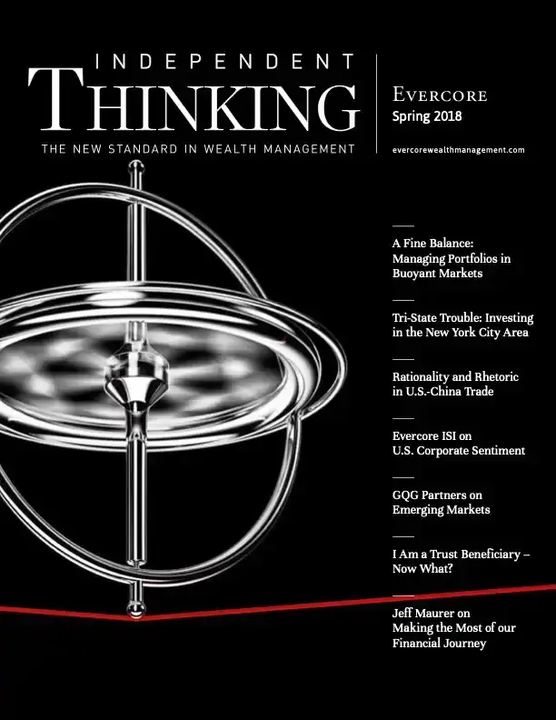Volatile markets trigger anxiety and strong psychological reactions, making it a challenge to stay focused on wealth-planning fundamentals. The good news is that a market downturn can provide unique opportunities to strengthen a long-term strategic wealth plan. Here are some suggestions to stay on track, reduce risk and even take advantage of down markets in a volatile economic climate.
Defensive Wealth Planning
Certain foundational steps can help protect a wealth management portfolio in uncertain times.
Maintain Adequate Liquidity. Ensuring access to sufficient defensive assets – such as cash and Treasuries – for lifestyle needs and short-term obligations is the starting point. At current levels, markets could slide further, and having access to adequate liquidity reduces pressure to sell investments at depressed prices and trigger capital gains. Depending on the sources of income, it could be prudent to maintain adequate short-term reserves to cover at least one year of expenses. Setting up a secured line of credit could provide additional protection if necessary.
Recalibrate Asset Allocation. In addition to ensuring adequate defensive assets, a down market is an opportune time to reassess the overall investment mix in the context of individual and family risk tolerances, time horizons and financial objectives. Minor asset allocation adjustments can often help realign the investment strategy with long-term wealth-planning goals.
Tax-Loss Harvesting. If the portfolio includes positions with losses, consider harvesting them. Those tax losses can offset any current or future capital gains. From an asset allocation perspective, investors can reinvest in a similar index fund or exchange traded fund (ETF), to maintain a similar market exposure while avoiding the tax code’s wash-sale rule. This disallows losses when selling an investment if a “substantially identical investment” is purchased 30 days before or after the sale. To the extent that investors are working with multiple investment management firms, the lead advisor should coordinate the overall investment strategy so that one manager isn’t buying the same stock that another manager sold, which would disallow the loss under the wash-sale rule.
Adjust Timing for Charitable Giving. It may be prudent to wait until market values recover before making charitable gifts to a public charity, donor-advised fund or private foundation. Donating appreciated assets down the road can increase the impact of generosity while also allowing for a larger itemized deduction for the fair market value of the donation, free of any capital gains tax on the long-term appreciation.
Review Loans. With interest rates fluctuating, it’s worth reviewing current mortgages and other loans. Extending a fixed-rate period or locking in lower payments may improve financial flexibility.
Turning Volatility into Opportunity
While market downturns can be unsettling, they also open the door for long-term planning strategies.
Thoughtful Cash Investments. A drop in market values could be a compelling time to invest surplus cash. Investment entry points during market lows can pave the way for more significant long-term growth, especially as part of a rebalancing strategy aligned with long-term goals.
Roth IRA Conversion. Market dips provide a tax-efficient window to reduce the tax cost of converting traditional IRAs to Roth IRAs. You can pay tax on a lower asset value now and enjoy more potential tax-free growth moving forward. Investors can withdraw assets from a Roth IRA after age 59.5, completely free of income taxes. Heirs can later withdraw remaining Roth IRA assets without any income taxes. Time horizon is key in evaluating this strategy.
Maximize the Lifetime Gift and Estate Tax Exemption. The current $13.99 million per person ($27.98 million per married couple) exemption presents a powerful opportunity for gift, estate and generation-skipping transfer, or GST, tax planning. Transferring assets when values are depressed locks in potential recovery and appreciation outside the taxable estate. Using trust strategies – such as spousal lifetime access trusts, or SLATs, grantor retained annuity trusts, or GRATs, sales to intentionally defective grantor trusts, or IDGTs, and/or Delaware dynasty trusts – can not only provide additional asset protection for loved ones, but all the potential market recovery and future growth of the assets can be transferred completely free of gift, estate and GST taxes to future generations.
Fix Underperforming GRATs. If a prior GRAT has underperformed, consider swapping in cash, bonds or promissory notes for the assets that have gone down in value, then re-GRAT those depressed assets to reset growth potential as part of a new GRAT strategy with a higher likelihood for success. In a way, the re-GRAT strategy is like “heads, you win; tails, you don’t lose.”
Updating the Financial Plan
Updating a lifestyle and retirement financial planning analysis can help mitigate feelings of panic and prevent imprudent overreactions to a market downturn. Testing the plan against various market scenarios – including through our calculations around potential maximum drawdowns and periods of higher inflation – can help investors better assess the probability of financial success and identify any necessary changes. Examples of potential wealth-planning adjustments could include modifying spending levels, adjusting asset allocation, factoring in alternate income sources like employment, dividends, interest or trust distributions, and reassessing required minimum distributions.
Balancing Short-Term Defense with Long-Term Opportunity
While it’s natural to feel uneasy during market downturns, it is important to stay engaged. The right strategies can help investors weather today’s volatility while laying the groundwork for long-term success.
In an economically challenging environment with increased market volatility, staying in close contact with your wealth management advisor is more important than ever. If you’d like to revisit your wealth plan, discuss any of the strategies mentioned above, or simply talk through what’s on your mind, our Evercore Wealth Management team is here for you. Please don’t hesitate to reach out.
Justin Miller is a Partner and the National Director of Wealth Planning at Evercore Wealth Management and Evercore Trust Company. He can be reached at [email protected].










